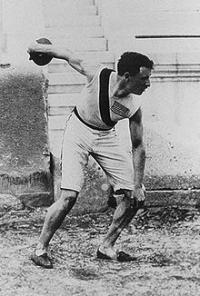
The first U.S. Olympic team were this foursome from Princeton: Francis Lane, Herbert Jamison, Robert Garrett (discus champ) and Albert Tyler.

Robert Garrett, from the Princeton field & track team, won the Discus Throw in the first modern Olympic Games.
Editor’s note: As the 31st Games of the Olympiad approaches, August 5-21 in Rio de Janeiro, I thought it would be interesting to resurrect stories of former Olympics as written in Coconut Times in the summer of 1992, year of the Games in Barcelona, Spain.
There are only two places today where people from all parts of the world gather: the United Nations and the Olympics. The Olympic athletes represent an almost complete economic cross section of the world’s population. Lawyers, businessmen and even royalty have taken part in the Olympic Games. The games are truly universal [global].
The Olympic Games were begun before the Golden Age of Greece and ran uninterrupted for more than a thousand years. The ancient Olympic Games began in the 13th century B.C. and ended in 394 A.D. Their origin is obscure but several stories abound.
The early games became part of religious rites of the early Greeks. The athletes were treated as demi-gods. Both kings and common people competed. Sprigs of olive branches were awarded to the winners.
The first record of the Ancient Olympics was the Coroebus victory in a 200-yard foot race recorded in 776 B.C. This is when the Greeks began reckoning time by Olympiads (the 4-year intervals between the games).
In the beginning, all athletes competed in the nude. Women were barred from competition; at least until the 128th Olympiad when a girl was recorded as the winner of a chariot race.
The entire religious significance of the games was lost with the rise of the Roman Empire.
Corruption set in and the games were banned in 394 A.D. by Roman Emperor Theodosius. The modern Olympic Games are the heirs of the ancient games. For over a half century of their renewed existence, they have survived the life and death of nations, spanned devasting depressions, and lived through two world wars.
This brings us to the 1st Olympiad in Athens, Greece, 1896.
“The important thing in the Olympic Games is not to win but to take part, the important thing in life is not to win but to take part, the important thing in life is not the triumph but the struggle. The essential thing is not to have conquered, but to have fought well. To spread these precepts is to build up a stronger more scrupulous and more generous humanity.’
– De Cubertin
Baron Pierre de Coubertin of France conceived the modern Olympic Games. He proposed the idea in 1892 and spent the next three and a half years drumming up support. Greece had the strongest interest so the first Olympic Games were held in Athens.
The 1896 Athens games were funded by a gift of one million drachmas from the wealthy architect Georgios Averoff, and by selling souvenir stamps and medals.
Competitors came from England, France, Germany, Denmark, Switzerland, Hungary, Austria, Greece and the United States. The U.S. won 9 of the 12 track and field events. The discus throw was not practiced in the United States at the time but Bob Garrett, Capt. of the Princeton track and field team, had been practicing with a homemade discus on the Princeton campus. When he arrived in Athens, he discovered the regulation discus was much lighter than the one he had practiced with; so he entered the event and beat the Greek champion by more than 7 inches for the Gold medal.
The Greeks had by far the most athletes in competition. Greece and the United States tied, each collecting 10 Gold medals.
«Go back to the previous page.

